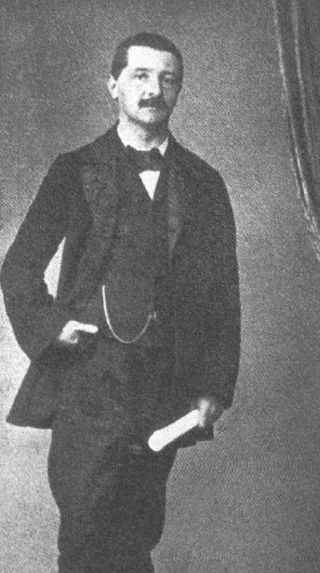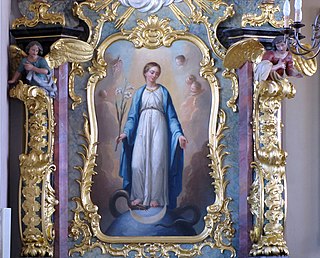
The Magnificat, WAB 24 is a setting of the Magnificat for SATB choir and soloists, orchestra and organ composed by Anton Bruckner in 1852.

The Kronstorfer Messe, WAB 146, is a missa brevis composed by Anton Bruckner in 1843-1844.

The Messe für den Gründonnerstag, WAB 9, is a missa brevis composed by Anton Bruckner in 1844.

Virga Jesse, WAB 52, is a motet by the Austrian composer Anton Bruckner. It sets the gradual Virga Jesse floruit for unaccompanied mixed choir.

Christus factus est, WAB 11, is a sacred motet by Anton Bruckner, his third setting of the Latin gradual Christus factus est, composed in 1884. Before, Bruckner composed in 1844 a first piece on the same text as gradual of the Messe für den Gründonnerstag, and in 1873 a motet for eight-part mixed choir, three trombones, and string instruments ad libitum. The motet is an expressive setting of the gradual, influenced by Wagner's music.

Os justi, WAB 30, is a sacred motet composed by Anton Bruckner in 1879. Os Justi is a Gregorian chant used as gradual of the Commune Doctorum, and as introit I and gradual II of the Commune Confessoris non Pontificis.

Pange lingua, WAB 31, is a sacred motet composed by Anton Bruckner in c. 1835. It is a setting of the first strophe of the Latin hymn Pange lingua for the celebration of Corpus Christi.

Asperges me, WAB 4, is a sacred motet composed by Anton Bruckner. It is a setting of the Latin Asperges me, the antiphon used for the celebration of Asperges.

Dir, Herr, dir will ich mich ergeben, WAB 12, is a sacred motet composed by Anton Bruckner in c. 1845.

Libera me, WAB 21, is the first of two settings of the absoute Libera me, composed by Anton Bruckner in c. 1843.

Tantum ergo, WAB 32, is the first of eight settings of the hymn Tantum ergo composed by Anton Bruckner in 1845.

Tantum ergo, WAB 43, is the second of eight settings of the hymn Tantum ergo composed by Anton Bruckner in c. 1845.

Tantum ergo, WAB 42, is a setting of the hymn Tantum ergo composed by Anton Bruckner in 1846.

Tantum ergo, WAB 44, is the last of eight settings of the hymn Tantum ergo composed by Anton Bruckner in c. 1854.

The Two Aequali, WAB 114 & WAB 149, were composed by Anton Bruckner in 1847.

The two Totenlieder, WAB 47/1 & 47/2, are elegies composed by Anton Bruckner in 1852.

Salvum fac populum tuum, WAB 40, is a motet composed by Anton Bruckner in 1884.

Veni Creator Spiritus, WAB 50, is a motet composed by Anton Bruckner in c. 1884.

Inveni David, WAB 19, is a sacred motet composed by Anton Bruckner in 1868.


















